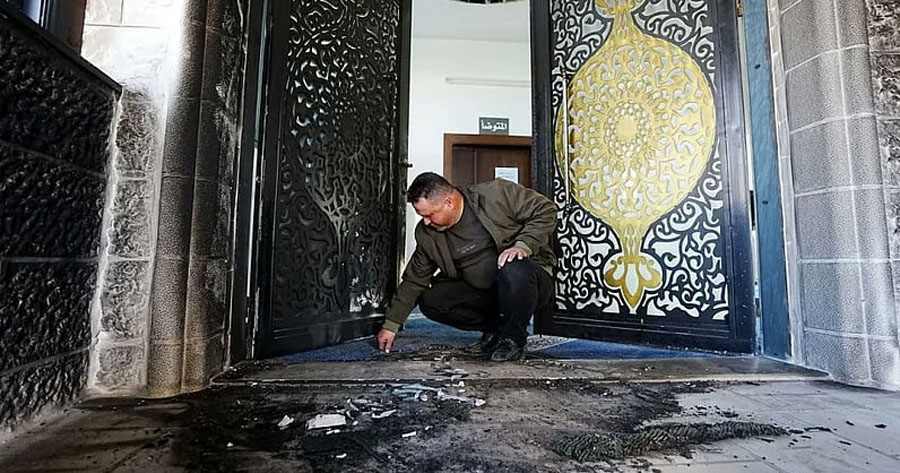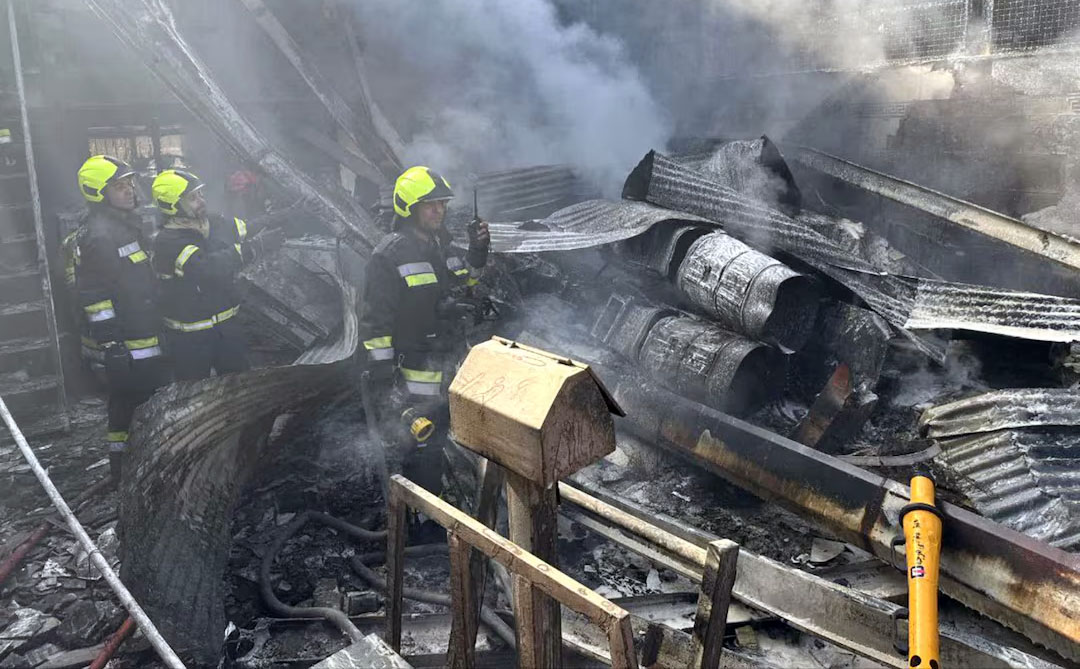International
Nigerian man kills wife months after relocating to UK

Olubunmi Abodunde, a Nigerian living in the United Kingdom, reportedly beat his wife, Taiwo, to death with their son’s skateboard, according to the Daily Mail.
The couple, who had three children, arrived in the UK from Nigeria in 2022 and frequently feuded over reported relationships and financial disagreements.
According to the news outlet, 48-year-old Abodunde had been investigated by Suffolk Police several times for domestic abuse and was scheduled to stand trial for murder, but changed his plea to guilty on Wednesday after the jury was sworn in.
During the abuse, officers heard ‘a number of fringes’ inside the house, which Abodunde had entered despite bail restrictions imposed the day before that barred him from the residence due to another violent incident.
When they arrived 25 minutes later, they discovered Taiwo, 41, with her’skull bashed in’.
However, Judge Martyn Levett, sitting at Ipswich Crown Court, cautioned him that the only conceivable penalty was life imprisonment.
Suffolk Constabulary submitted itself to the Independent Office of Police Conduct, which confirmed that three officers were being investigated.
An IOPC spokesman said, “We advised two Suffolk officers that they are under investigation for potential breaches of the police standards of professional behaviour at the level of gross misconduct.
“We advised another officer that they are under investigation at the level of misconduct.”
READ ALSO:
- Nigerian Army loses another major to bandits’ attack in Katsina
- Police arrest cultists for invading Anambra hotel with charms
- How ex-Head of Service Oyo-Ita diverted N3bn public funds to private firms
Abodunde has a history of mistrust and distrust towards his wife, accusing her of having affairs. He had been probed by police several times for alleged domestic abuse episodes prior to his wife’s murder.
He was detained on April 27 of last year, when police came to the couple’s house in Newmarket, Suffolk, and discovered Mrs. Abodunde with a split lip.
Later that day, he was released on police bail with the condition that he stay away from the marital residence and avoid approaching his wife.
However, after completing a night shift at Tesco, he returned home shortly after 9 a.m. to reportedly pick up his mobile phone.
At 9.20 a.m., two cops arrived to take Mrs. Abodunde’s testimony regarding the previous night’s incident, and they heard persistent banging inside.
But it wasn’t until 9.55 a.m. that they pushed their way in with permission from senior officers and discovered Mrs. Abodunde ‘clearly dead’ near the front entrance.
A post-mortem examination revealed that she had been throttled until unconscious, then stamped on until her ribs were fractured, before her husband used the skateboard to kill her off. The hits were so hard that the skateboard was ruined.
Prosecutor Simon Spence KC told the court that the hammering officers heard was most likely caused by Abodunde continuing to assault his wife after she was unconscious or dead.
Mrs. Abodunde worked as a care home assistant in Cambridge, but her husband, a civil engineer by training, was unable to find work and took shifts at Tesco and Wickes.
Following his arrest for the murder, Abodunde was taken to the hospital “because he appeared to have some sort of mental episode.”.
He later argued in a police statement that he had acted in self-defence, saying, “My wife has subjected me to physical abuse for a number of years.
“On November 28, we got into an argument. She ran at me with a knife. I grabbed the knife and cut my hand. I was defending myself.”
However, the court heard that, while he had a hand injury, no knife was found near his wife’s body.
Nneka Akudolu KC, defending, said the amount of violence was ‘completely out of character’ for her client and could have been influenced by the medicine he was on. However, she stated that no medical evidence would be supplied to back her assertion.
Following the court, Suffolk Police Detective Inspector Dan Connick stated, “This was an awful attack on a woman that has had a long-term impact on the community and, most importantly, on the victim’s family.”
“We are pleased that Taiwo’s family will no longer have to go through the pain of a trial.
“Our thoughts remain with Taiwo’s family and friends, and we hope this result will bring some small comfort to them.”
Nigerian man kills wife months after relocating to UK
International
Israeli Settlers Torch, Deface West Bank Mosque During Ramadan

Israeli Settlers Torch, Deface West Bank Mosque During Ramadan
TELL, West Bank — Israeli settlers have vandalized and set fire to the Abu Bakr al-Siddiq Mosque in the Israeli-occupied West Bank, authorities confirmed, marking the latest in a series of attacks on Palestinian religious sites amid a surge in settler violence. The attack occurred early Monday during the Muslim holy month of Ramadan.
Worshippers arriving for morning prayers discovered the mosque’s entrance smoldering, with black smoke staining the doorway and broken glass scattered across the area. According to the Palestinian Authority Ministry of Religious Affairs, settlers spray-painted offensive graffiti, including derogatory references to Islam and slogans linked to extremist “price tag” operations.
Local resident Munir Ramdan described the scene: “I was shocked when I opened the door. The fire had been burning here, the glass was broken, and the door was damaged.” Security footage reportedly shows two individuals carrying gasoline and spray paint approaching the mosque before fleeing the scene.
READ ALSO:
- Iranian Army Helicopter Crashes Into Market, Four Killed
- Mother of Three Dies by Suicide After Fiance’s Family Rejects Marriage in Ijebu-Ode
- RCCG Pastor Peter Akpe Confirmed as Bayelsa Deputy Governor
The incident is part of a broader pattern of attacks on mosques in the West Bank, with the Palestinian Ministry of Religious Affairs reporting that 45 mosques were vandalized or attacked last year. Residents said the assault was a deliberate provocation during Ramadan, targeting both the religious sanctity of the mosque and the spiritual practice of fasting.
The Israeli military and police responded to reports of the incident and are actively searching for suspects. While the military condemned harm to religious institutions, Palestinian officials and rights groups say Israeli authorities often fail to hold settlers accountable for violence.
The attack comes amid a recent rise in settler violence, including last week’s killing of a 19-year-old Palestinian-American, Nasrallah Abu Siyam, highlighting ongoing tensions between settlers and Palestinian communities in the occupied territories.
Israeli Settlers Torch, Deface West Bank Mosque During Ramadan
International
Iranian Army Helicopter Crashes Into Market, Four Killed

Iranian Army Helicopter Crashes Into Market, Four Killed
At least four people have died after an Iranian Army helicopter crashed into a fruit and vegetable market in Dorcheh, central Iran, on Tuesday morning, authorities and state media reported.
The helicopter, reportedly on a training flight, went down around 9:09 a.m. local time, striking market stalls and sparking a fire, which was later extinguished by emergency responders. Among the deceased are the pilot and co-pilot, both members of the Iranian Army Aviation, and two civilians who were present at the market during the crash.
Officials indicated that a technical malfunction may have caused the accident, though a full investigation is ongoing to determine the exact circumstances. Local authorities and rescue teams were immediately dispatched to secure the scene, assist victims, and clear debris from the market area.
READ ALSO:
- Mother of Three Dies by Suicide After Fiance’s Family Rejects Marriage in Ijebu-Ode
- RCCG Pastor Peter Akpe Confirmed as Bayelsa Deputy Governor
- BREAKING: El-Rufai Asks Court to Quash DSS Charges, Demands ₦2bn Damages
Dorcheh, located about 330 km south of Tehran, is in a region hosting key military installations, including a major airbase. The crash adds to concerns over the safety of Iran’s aging military aircraft fleet, which has been affected by decades-long sanctions restricting access to spare parts and modern equipment.
This incident comes days after another military aircraft crash in Hamadan province, where an F‑4 fighter jet went down during a training flight, killing one of its pilots. Aviation safety remains a growing concern in Iran, particularly for military training operations.
Authorities have pledged a comprehensive investigation into the Dorcheh helicopter crash and have called for measures to ensure safety around public areas near military flight paths.
Iranian Army Helicopter Crashes Into Market, Four Killed
International
15 Killed as Peruvian Military Helicopter Crashes During Flood Relief Mission

15 Killed as Peruvian Military Helicopter Crashes During Flood Relief Mission
At least 15 people, including seven children, were killed after a Peruvian Air Force Mi‑17 helicopter crashed on Sunday while carrying out a flood relief and rescue mission in the Arequipa region of southern Peru. The helicopter was part of a humanitarian assistance operation responding to severe flooding and landslides that have damaged homes, roads, and infrastructure across the region.
The Mi‑17 helicopter, carrying 11 passengers and four crew members, vanished from radar while flying from Pisco toward the coastal town of Chala Viejo in Caravelí Province. Loss of radio contact triggered an intensive search and rescue operation, involving Peruvian special forces, police units, and Air Force personnel, which located the wreckage on Monday.
Among the victims were seven minors aged between 3 and 17 years old. Adults confirmed dead include Colonel Javier Nole Gonzales, Air Force officer Sergio Danner Paucar Centurión, Elisa Bernal Paredes, Zoila Fernandez Medina, Luis Cárcamo, Kamila Jove, and Leiner Huamán, along with other passengers whose identities are being verified. All four crew members perished in the crash.
READ ALSO:
- Nigeria Allegedly Paid Boko Haram to Free Abducted Schoolchildren, Teachers – AFP Report
- Ijebu Ruling House Appeals to Tinubu to Resolve Awujale Stool Deadlock
- Human Rights Lawyer Says Amupitan’s INEC ‘Failed Woefully’ in FCT Election
The Peruvian Air Force (FAP) described the incident as a “tragic accident” and expressed its deepest condolences to the families of the victims. An Accident Investigation Board has been activated to determine the exact cause of the crash, including the possibility of mechanical failure, adverse weather conditions, or operational challenges.
This tragedy comes amid one of the most severe flood emergencies in Arequipa in recent years, with heavy rains causing rivers to overflow, landslides, and forced evacuations. The helicopter’s mission was intended to provide emergency relief, transportation of personnel, and logistical support to affected communities. Authorities warned that the loss of the aircraft and personnel may impact ongoing rescue operations.
Local officials and disaster response teams continue to assist flood-affected families, providing temporary shelters, food, and medical aid. Observers noted that the crash underscores the risks faced by rescue teams operating in disaster-prone regions and highlights the need for enhanced aviation safety measures in extreme weather conditions.
15 Killed as Peruvian Military Helicopter Crashes During Flood Relief Mission
-

 Business2 days ago
Business2 days agoDangote Opens Refinery Investment to Nigerians With Public Share Sale Plans
-

 News4 hours ago
News4 hours agoBREAKING: IGP Kayode Egbetokun Steps Down as Tinubu Names Tunji Disu as New Police Chief
-

 Education3 days ago
Education3 days agoUTME: JAMB Clarifies Position on Hijab During Biometric Capture
-

 Politics2 days ago
Politics2 days agoTinubu Hails Wike as APC Dominates 2026 FCT Area Council Elections
-

 Entertainment2 days ago
Entertainment2 days agoRegina Daniels Takes Delivery of ₦150m 2026 GAC Trumpchi M8 SUV
-

 Politics2 days ago
Politics2 days agoFCT Council polls: APC Wins Four Chairmanship Seats as PDP Takes Gwagwalada
-

 News2 days ago
News2 days agoYoruba Muslim Group Dismisses Viral Ramadan Date Claim, Reaffirms Sultan of Sokoto’s Authority
-

 Politics2 days ago
Politics2 days agoOpposition Weakens as Another Governor Eyes APC Move















